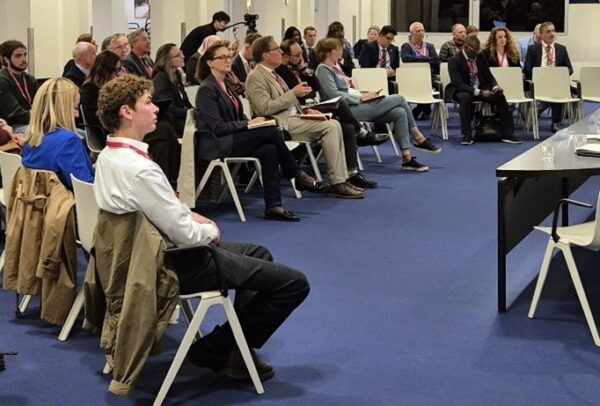On June 12, 2024, The Hague Roundtable on Climate and Security met for the 15th time, around the theme “Sustainable climate diplomacy & cooperation for disaster resilience – inclusive pathways with a focus on Latin America & the Caribbean”. The event focused on climate adaptation, resilience, development and inclusion for more cooperative approaches across regions and sectors.
The Hague Roundtable on Climate and Security facilitates cross-sector dialogue to support international cooperation on climate impacts such as water scarcity, natural disasters, and migration.
The meeting was held at the International Institute of Social Studies (ISS) in The Hague, co-organized by ISS, The Hague Humanitarian Studies Centre (HSC), in collaboration with The Hague Humanity Hub. Around 60 participants from more than 40 organizations, embassies, and ministries took part and shared knowledge and insights.
This edition of the roundtable counted keynote addresses from experts in the field such as Ronald Jackson, Head of Disaster Risk Reduction and Recovery for Building Resilience at UNDP; Dr. Murat Arsel, Professor of Political Economy of Sustainable Development at ISS; Dr. Farhad Mukhtarov, Assistant Professor of Public Policy and Governance at ISS; and Meike van Ginneken, Netherlands Special Envoy for Water Affairs. Opening remarks were offered by Dr. Thea Hilhorst, Professor of Humanitarian Studies, ISS.
After the opening addresses, participants broke out in three groups, focused on:
- Group 1: Climate Justice and the Role of Civil Society
- Group 2: Feminist Foreign Policy in Diplomacy for Resilience Development
- Group 3: Resilience and Diplomacy Action across Regions and Sectors.

Key Takeaways
The speakers addressed several obstacles on the path towards effective disaster resilience and aid, as well as some potential solutions.
Ronald Jackson pointed out the failures of multilateralism in providing a timely and effective response to crises. He, as well as Dr. Thea Hillhorst, mentioned the adverse effects of siloed humanitarian efforts, which focus on short-term solutions and ignore the systemic nature of today’s risks. As Dr. Hillhorst reiterated, crises are not siloed, and do not happen discreetly and separately from each other. The solutions lie in working on preparatory and reactionary action and bringing new players to the decision-making table.
Matt Luna, founder of The Hague Roundtable on Climate and Security, underscored this point by celebrating the number and variety of organisations and countries present at the meeting. In his view, this is proof of the value of investing in cross-sector, transboundary approaches to climate impacts, which have better hopes of improving resilience than the current state of affairs.
With climate change, we know it is going to rain. It is going to pour. It is time to fix the roof before it starts pouring.
Meike van Ginneken, Netherlands Special Envoy for Water Affairs
Dr. Farad Mukhtarov’s message resonated with the issues brought forward by Ronald Jackson: the current multilateral aid and development regime, for example on the issue of water, is centred around “aid-and-trade” and “development cooperation” principles. What these mean is that rich, developed countries export technology and services, but end up creating further inequality and marginalisation of poorer groups in the regions they are meant to aid. Furthermore, the focus on short-term, tangible results often overshadows the need for long-term adaptive governance and trust-building.
Dr. Murat Arsel also shared a word of warning about taking care of the most vulnerable and marginalised communities, on the theme of energy transition. In his speech, he illustrated the risks inherent to global warming, and thus the urgent need for replacing fossil fuels with renewable energy sources. However, he cautioned that most governments are not prepared for a fair and just energy transition, and therefore risk further impoverishing at-risk communities on the path toward a climate-stable world.
Echoing Dr. Mukhtarov’s conclusion about the need for trust-building, Meike van Ginneken’s address at the Roundtable centered around the popular wisdom, “Fix the roof while the sun is shining”: building trust during peaceful times is key to prevent conflict during times of hardship. Climate change increases the chances of water being a trigger of conflict or war. Basin organizations around the world have helped to avoid water and other conflicts escalating into war, but this will only get harder as the climate crisis gets worse. Van Ginneken highlighted the need to keep dialogue alive, and to agree on conflict resolution mechanisms, before crises and disasters have the chance to trigger conflict.
Find the complete report about the event here.
What’s next
On September 18, The Hague Roundtable on Climate and Security, the Hague University of Applied Sciences and the Hague Humanity Hub will organise a roundtable on the interlinkage between climate and law enforcement. Titled Climate Chaos and Law Enforcement, this event will be an interactive dialogue on strategies for cooperation with civil populations in climate-related challenges. You can find out more about participating here.
In parallel, the community is working on preparing for COP 29 in Azerbaijan and collaborating on various events and sessions on climate related topics that will be held during the Hague Climate week November 11 – 15. We will share more possibilities for interaction and exchange on this as soon as possible. Will you be attending COP 29 and would like to join these sessions? Feel free to already reach out to us at programming@humanityhub.net.
Make sure to attend our Blue Drinks networking series focusing on water issues – the next edition on September 26 will be an open mic session on innovation! Do you have a great new idea or project you want to share? Join us!
There will be more exciting meetups and opportunities to contribute and learn in the coming months. Do you want to become part of this community, share or propose your initiative and stay in the loop about climate related initiatives? Drop us a line at programming@humanityhub.net!
